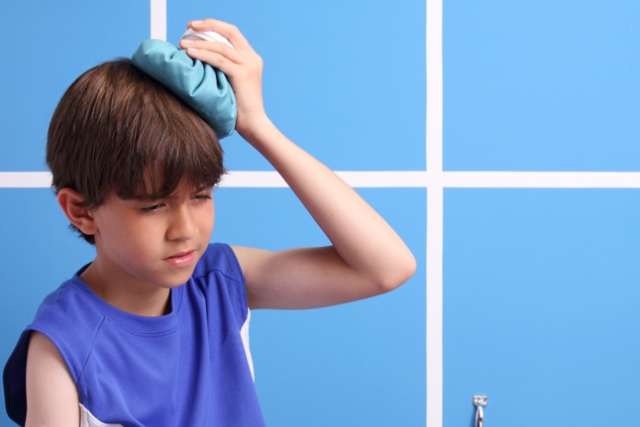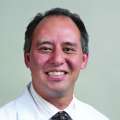“The most precious resource that we have in the world is the pediatric brain,” says Christopher Giza, MD, professor of pediatrics and neurosurgery and pediatric neurology division chief, UCLA’s Mattel Children’s Hospital.
They represent the future of both the individuals they inhabit and the society they will influence, he fervently believes.
“This is our world’s future. No matter your specialty, your goal at the end of the day is for your patient to have the healthiest, most developed brain that is possible given their circumstance.”
However, brain injuries during childhood present a huge challenge. The top cause of severe traumatic brain injury (TBI) in infants is abusive head trauma (formerly called shaken baby syndrome).
Dr. Giza says he also regularly sees children injured via car/bicycle/skateboard accidents, falls, sports and recreation and other circumstances.
“Children aren’t just little adults,” says Dr. Giza. “Because their brains are smaller doesn’t mean their problems are smaller. Traumatic brain injury in a developing brain is the most complex injury, to the most complex organ, at the most complex time. The leading cause of acquired death and disability for people under 40 isn’t cancer or hemorrhage or stroke; it’s TBI.”
Dr. Giza has been at UCLA for 30 years. He graduated from Dartmouth College, received his medical degree from West Virginia University, interned at the University of Pennsylvania and trained in adult and pediatric neurology at UCLA.
Then he took a two-year detour: He joined the Yosemite Search and Rescue (YOSAR) team. “I was mediocre among the world-class climbers in Yosemite, but I was the only physician on the team,” he says.
He stayed connected to UCLA via involvement with a research project cataloging patients who’d undergone pediatric epilepsy brain surgery, while also providing care to climbers who’d fallen and suffered brain and spinal cord injuries.
In 1998, Dr. Giza left Yosemite’s ruggedness to return to UCLA. “I was given the opportunity to work as a postdoctoral fellow for three years to undertake basic laboratory research in TBI,” he explains.
In 2001, he joined the faculty. In 2011, he traveled to Afghanistan as a civilian advisor to the Department of Defense, and in 2012, he founded UCLA BrainSPORT, a comprehensive sports concussion/mild TBI program for safety, performance, outreach, research and treatment. In 2014, the newly endowed UCLA Steve Tisch BrainSPORT Program was invited to President Barack Obama’s Healthy Kids and Safe Sports Concussion Summit, where President Obama announced the UCLA program.
“The idea is not to make people stop playing sports but to understand risks and benefits in regard to brain development and to prevent brain injuries,” says Dr. Giza.
Having served on the CDC Pediatric Mild TBI Committee, NCAA Concussion Task Force and the California Athletic Commission, he now serves on the Major League Soccer Concussion Program Committee, the National Basketball Association Concussion Committee, advises the U.S. Soccer Federation and directs the NFL Neurological Care Program at UCLA.
Combatting TBI
Once called “the silent epidemic,” TBI is more widely recognized today because of issues publicized by sports and the military.
Yet “it is still invisible in many ways,” says Dr. Giza. “A cancer or stroke survivor can be an inspiring spokesperson for their condition. But for people with TBIs, it’s harder. Those with severe injuries may find it difficult to be spokespeople because of their injuries. And those who get better often don’t want the stigma of being identified as someone with a brain injury.”
Dr. Giza says he uses his vision of the supreme importance of developing brains as an anchor for education around pediatric brain injuries. His division, comprised of 14 faculty and 15 fellows, plus nurses, dietitians, occupational therapists and research assistants, offers a “concussion champions” TBI course, which trains 50 primary care providers in each session.
“We’ve never turned down an opportunity to speak about it,” he says. “If a small school wants us to talk to fourth graders about head injuries, we’ll send someone. We recently did an education program for physicians, NPs and PAs in the Los Angeles Unified School District to prepare for fall sports.”

Dr. Giza recently returned from the University of Tasmania in Australia, where he participated in a massive online course on head injuries. “We have had tens of thousands of people viewing it,” he says, noting he then went to the Queensland Children’s Hospital and provided input on new concussion guidelines for Australia and New Zealand.
“That’s one way to reach a lot of people,” Dr. Giza adds. “But another way is right here, with daily clinics. We started with one half-day pediatric head injury clinic per week, and now we have five. Pediatric neurology clinics happen every day of the week, and cover other diagnoses like epilepsy, headaches, neurodevelopment, autism, cerebral palsy, genetics and much more.”
He stresses how essential it is to teach future, as well as current, care providers about pediatric head injuries and TBI. UCLA has a pediatric neurology residency program, a pediatric epilepsy fellowship program and a sports neurology and neuropsychology fellowship program affiliated with BrainSPORT.
“In addition, we train occupational therapists, general pediatricians, sports medicine doctors, etc. Then each takes what we’ve taught them into their own practices and spreads understanding exponentially,” he says. “We’re aiming for all the impact we can get, because ensuring children’s brains develop to their fullest potential is the single most important thing we can do. I’ve dedicated my life to it.”




